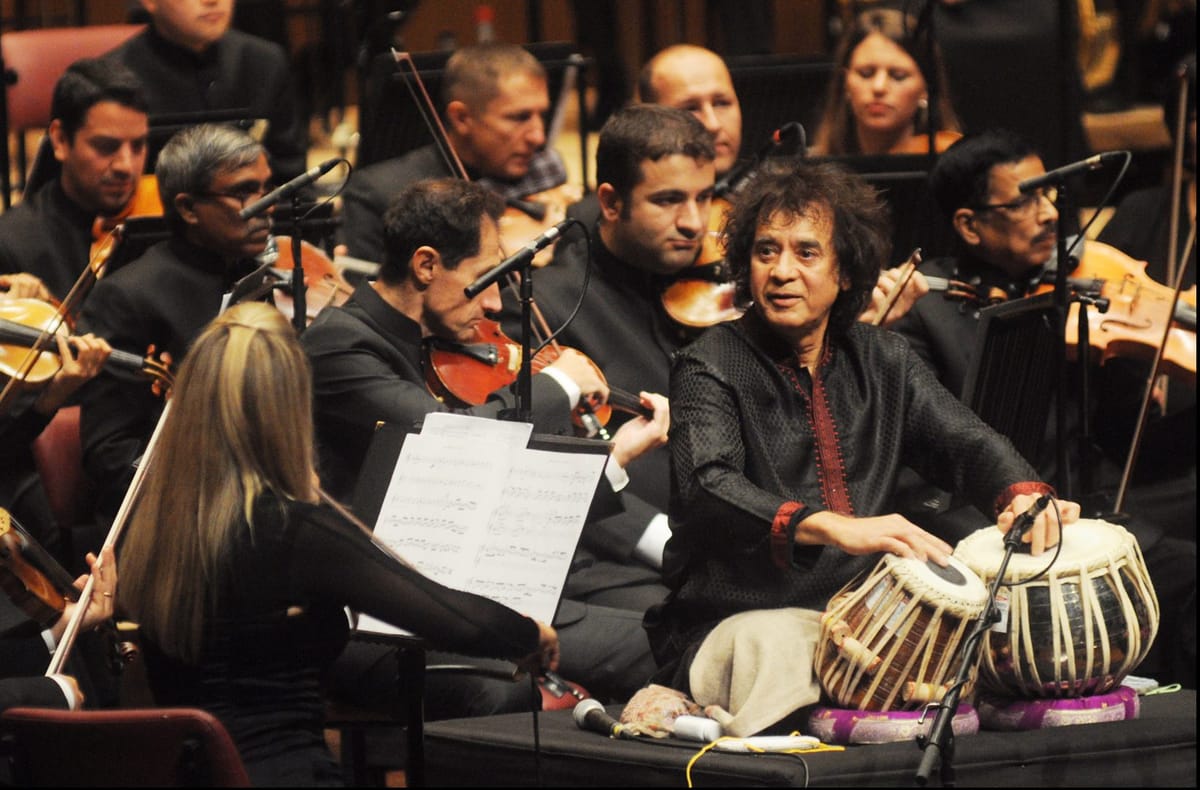Zakir Hussain and the SOI open UK tour at Birmingham’s Symphony Hall

The Symphony Orchestra of India (SOI) began their inaugural tour of the UK at Birmingham’s Symphony Hall on 19th February 2019. The programme included a UK-premiere of Zakir Hussain’s tabla concerto, Peshkar (2015), sandwiched between two ever-popular works for symphony orchestra – Berlioz’s Roman Carnival Overture (1844) and Rimsky-Korsakov’s Scheherazade (1888).
The event began with a reception during which the Mayor of Birmingham welcomed the orchestra and its Associate Director and conductor, Zane Dalal, to the UK’s second city. This was followed by pre-concert discussion with Dalal during which he spoke engagingly about the SOI’s establishment in 2006, its position as India’s ‘first and only professional orchestra’ as well as the multinational composition of the orchestra. He also spoke about encouraging orchestral playing amongst a new generation in India and reaching new and diverse audiences with Western and Hindustani classical music.
The concert began with an energetic rendition of Berlioz’s Roman Carnival Overture – a work composed in 1844 from material and themes originally written for the opera Benvenuto Cellini. The SOI and Dalal dealt well with the complex syncopations and captured the carnival atmosphere with verve. A particular highlight was the solo for cor anglais played beautifully by Ben Marshall.
After the applause, the first violins were moved away from the conductor’s podium to allow room for a cushioned platform on which the evening’s tabla soloist, Zakir Hussain, would be seated. Hussain’s status as a preeminent tabla performer as well as his involvement with musical projects such as Shakti – a fusion band founded by John McLaughlin in 1974 – preceded him as he entered to rapturous applause. The title of the concerto – Peshkar – is derived from an opening composition performed in tabla recitals. Dalal had explained in the preconcert discussion that if the sections for solo tabla were performed successively they would be typical of peshkars found in performances of Hindustani classical music. The virtuosity and complexity of Hussain’s playing in these sections was breath-taking. But what really caught my attention was the dialogue between Hussain, Dalal, and the orchestra. The rhythms introduced by the tabla were passed throughout the orchestra creating a sense of interaction between the various sections of the orchestra. In the moments when Hussain played with select soloists, the audience experienced an intimacy reminiscent of smaller ensembles typically found in Hindustani classical music and Western chamber music. Audience members who were initially seated in the corners of the auditorium moved mid-performance to get a better view of Hussain, and rightly so; seeing the interactions between Hussain and the orchestra as well as the mesmerising movements of his hands enhanced the aural experience. Hussain and the orchestra deservedly received a standing ovation and he returned for an encore followed by another standing ovation.
After a short interval, the concert concluded with Rimsky-Korsakov’s Scheherazade. Scheherazade is a symphonic suite based on One Thousand and One Nights – a collection of Arabic folk tales. The programme notes that accompanied the concert included Rimsky-Korsakov’s brief introduction to the score that summarises the story the work is based on:
The Sultan Schahriar, convinced of the falsehood and inconstancy of all women, had sworn an oath to put to death each of his wives after the first night. However, the Sultana Scheherazade saved her life by arousing his interest in the tales which she told during the 1001 nights. Driven by curiosity the Sultan postponed her execution from day to day and at last abandoned his sanguinary design.
The orchestral colours Rimsky-Korsakov scored to illustrate this story were conveyed amply by the SOI who also negotiated the numerous changes in tempo and character deftly. A particular highlight was principal violinist Adelina Hasani’s rendition of the recurring leitmotif that represents the character Scheherazade. The orchestra and Dalal received enthusiastic applause encouraging Dalal to return to the stage for an encore of the instantly recognisable theme from the 1960 film The Magnificent Seven composed by Elmer Bernstein.
This was a fun, varied and engaging concert that made for a very enjoyable, accessible and interesting evening of music. The event suited Birmingham and the audience; Birmingham is an extremely diverse city with a significant South Asian community, and of the 1500 or so audience members a sizeable proportion were from Birmingham’s South Asian population. If one of the goals of this concert was to introduce the symphony orchestra, Western and Hindustani classical music, and the tabla to diverse and new audiences, this was successfully achieved.
Editor’s Note: A previous version of this review stated the encore piece incorrectly. This has now been updated.






